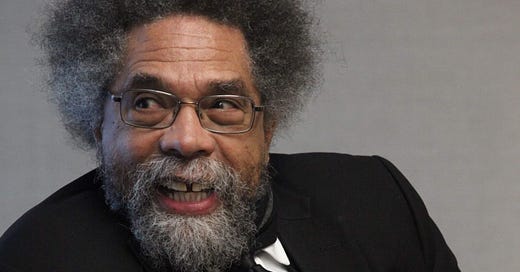by Robin Ligon-Williams
It was a potent, powerful, and poignant private discussion with the inimitable Dr. Cornel West, an hour before he addressed a sold-out crowd at Ivy Tech Community College on Jan. 26 for its annual “Doing the Dream” event, commemorating the life and legacy of Dr. Martin Luther King, Jr.
When asked about the timeliness of his journey to Kokomo to address the community, West said that Kokomo “is at a fork in the road.”
“Things are taking off,” said West. “So, if it’s going to take off financially, then it also needs to take off spiritually and morally. It’s a wonderful thing that more money flows, that more jobs with a living wage are available. That’s very important, but human beings don’t live by bread alone. It is the quality of their heart, the quality of their love, the quality of relationships, and the quality of how they treat others.
“Martin learned that at Ebenezer Baptist Church. He didn’t invent that. He comes out of tradition, and there are a lot of voices that are taking that seriously. So, those of us who are trying to build a legacy of Martin, how do we empower each other in the community?”
Ironically, West did not know that the occasion of his 2023 appearance also marks the 100th anniversary of Kokomo’s infamous Ku Klux Klan rally and march. The largest documented in American history, this rally drew more than 200,000 Klan members to Kokomo on July 4, 1923. West said Kokomo is not the only place where there is a legacy of hate.
“The whole country has a legacy of hate in terms of genocide, extermination of indigenous peoples, African slavery, the massive mistreatment of poor white brothers and sisters, and patriarchal violence against women,” said West. “All of those are forms of hate. But that crystallizes a particular manifestation of hate in 1923 in Kokomo.
“One, you can’t be in denial about it. You have to acknowledge that it’s there and it has a legacy. Then you have to fortify yourself, put on a whole armor, and fight it. You fight it intellectually, spiritually, politically, economically, and culturally. You call for solidarity. It’s a human choice, not just Black people out there all by themselves. Every human being who wants to be a decent person has an imperative to fight that legacy of hate.”
In a book of speeches, sermons, and essays West compiled and edited, “The Radical King,” he uses the term “Santa-Clausification” to describe how many people choose to view and commemorate King’s legacy. By clinging to the safe, “feel good” aspects of King’s legacy, West said many often fail to recognize the true grit of his fervent, ardent activism.
When asked if he thought that this event might be a similar type of commemoration, West asserted that this year’s organizer, DeAndra Beard-Ingram, had shifted the paradigm. As Ivy Tech Kokomo’s new director of Diversity, Equity, and Belonging, her aim was to firmly focus the event’s trajectory with West’s straight-from-the-hip commentary and clarion call.
“DeAndra is fundamentally committed to the truth of King’s legacy, which is one of radical love,” posited West. “I’ll put it in musical terms. Love is funky, and King was a funk master. So, we’re not going to deodorize. In that sense he actually was a militant for tenderness and an extremist for love; a radical love warrior who was tied to struggling for justice. We are just being true to Martin.
“He was one voice among others. There’s Fannie Lou Hamer. There is Ella Baker. There’s Malcolm X, Gil Scott Heron, and Curtis Mayfield. All of these are love warriors of the highest, coming out of a Black tradition.”
West asserted that Dr. King’s radical brand of love precluded him from being pigeonholed, much like his contemporary “love warriors.” Rather, it made him a threat to the status quo.
“You have to situate Martin within the larger tradition that shaped and molded him,” said West. “We don’t just come in worshipping individuals, but we come in acknowledging the vibrant and vital tradition of which he is a major, major figure and voice and exemplar.
“Love is always a threat. I was blessed to write a song with a genius named Bootsy Collins, ‘Love is a Threat.’ It’s on his album ‘Funk Capital of the World.’ We’re right there in the studio working it out, and we came up with those words. It’s like Jesus on the cross. He’s a threat -- the highest level of love warriorship -- he’s a threat.”
West underscored Dr. King’s unmatched ability to touch people, including the impact he had on himself.
“I mean, what was beautiful about Martin was I heard him speak when I was 10 years old, and he had a tenderness about him,” said West. “He could touch people’s souls as well as their minds and hearts. That’s a rare thing.”
Dr. Cornel West also seemingly touched some hearts and souls at Ivy Tech with his message about the reverberation of Dr. King’s “radical love” on humanity.
Robin Ligon-Williams is an author, curator and ethnographer based in Kokomo, Indiana. Her commentary on Arts, Culture and Race has been featured in several publications, including the Indianapolis Recorder, Indianapolis Star, Gambit-New Orleans, SCLC National Magazine and the New York Times.




This is beautifully written. What an opportunity to be able to sit and talk with such a great mind - about such a great man. The history of the KKK meeting is most unfortunate. But what changes can come with 100 years!!! Just imagine what can be attained with another 100. Or a new mindset. A collective effort for change. A community! Thank you for sharing this interview. What a treat, honey!
Superb Storytelling!